While military innovations did play a crucial role in the armies of ancient civilizations, it was undoubtedly the Romans (among few) who pushed the scope of progressive technologies and deep tactical developments that directly affected their battlefield effectiveness. To that end, ranging from weapons, and formations to infrastructure, let us take a gander at ten incredible Roman military innovations you should know about.
Note – The ten military innovations are presented in an alphabetical manner, as opposed to chronology.
Contents
Battlefield Surgery
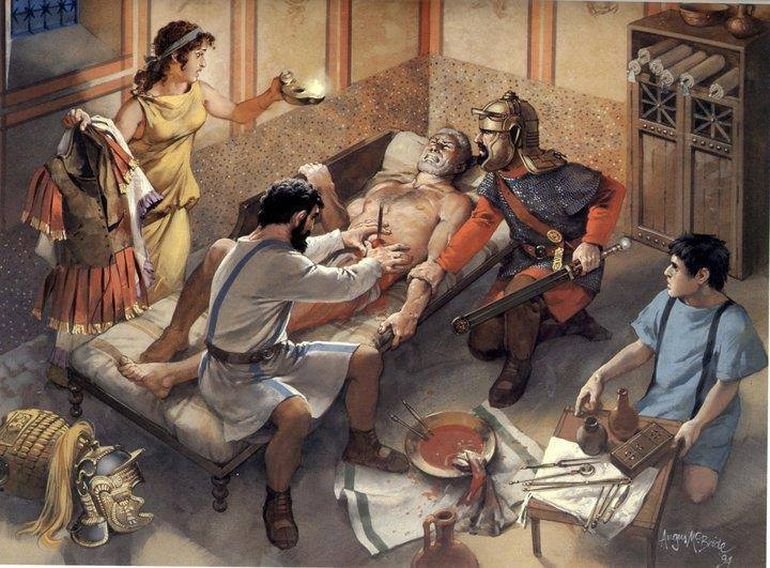
The Roman army and its incredible organizational depth constituted the greatest of Roman strengths, thus setting them apart from other ancient military institutions. One of the major advantages of the sheer organizational scope mirrored the self-sufficient capacity of the individual legions.
And it was the immunes, a group of highly trained specialists who were specifically employed to maintain the logistical and medical sustenance of the legions. Ranging from doctors, and engineers to architects, these men were exempt from the hard labor duties of the rank-and-file soldiers, while also earning more than them – thus hinting at the (presumed) crucial nature of their jobs.
Pertaining to the Roman medical professionals, their dedicated battlefield surgery units were instrumental in the use of innovative contraptions like hemostatic tourniquets and arterial surgical clamps to curb blood loss. This was complemented by antiseptic measures where instruments were disinfected with hot water before their real-time usage, thus espousing an ‘advanced’ form of surgery that only became the norm after the 19th century.
Moreover, the doctor’s job also entailed the supervision of sanitation quality in the army camps, which aided in the mitigation of dreadful logistical nightmares, otherwise known as the spread of diseases. Taking all of these factors into account, combined with a better diet, the Roman soldiers (possibly) tended to live longer than their civilian counterparts, thus alluding to the efficiency of the ancient Roman doctors and surgeons.
Carroballista
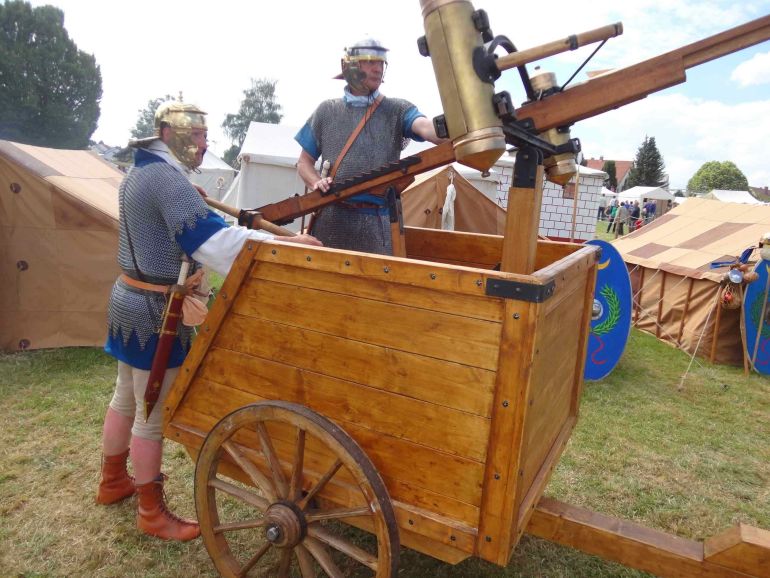
While the core ballista mechanism was (probably) developed by the ancient Greeks by the 5th century BC (in forms like oxybeles and gastraphetes), there is no doubt that the Romans advanced the practical scope of such fascinating weapon systems, along with their deployment and usage on ancient battlefields.
To that end, the manuballista was a Roman siege engine (originally based on the design of Heron of Alexandria) that has often been described as the “most advanced two-armed torsion engine used by the Roman army” (circa late 1st century AD).
The so-named carroballista was an extension of the similar manuballista technology, but its difference lay in its advantage of maneuverability. In essence, the weapon system was developed as a cart-mounted ballista, thus entailing a type of mobile field artillery. ArcheoArt has described the weapon in some detail, based on the reconstruction of Michael Lewis –
The caroballista: a powerful descendent of the Roman ballistae and catapultae. This two-man example is being used at some point in the Dacian War. It shoots heavy bolts, and is an extremely powerful weapon, thanks to the wide sweep of the arms, which transmit a huge amount of stored spring energy to the ammunition. The sinew-loaded spring frames are made of iron and have tough leather covers to protect them from enemy fire- and the weather.
The machine is mounted on a universal joint, atop a stand, and can be pointed in any direction. To shoot, one man turns the windlass to draw back the slider and rope, while his crew-mate holds it steady, and places a bolt on the slider; he then holds the tiller and aims, while the first pulls the trigger bar. The whole weapon is light enough for its two-man crew to move it around and load it onto a cart when the division has to move; in this way, it is the equivalent of a WW2 Bren gun.
According to Vegetius, the late Roman army adopted the carroballista as a standard mobile field artillery, with 55 carroballistae being the standard number that was distributed among each legion. Each of these war machines, having the advantage of a light yet stout metal spring frame, was transported by mules and operated by contubernium units (group of ten legionaries).
Corvus
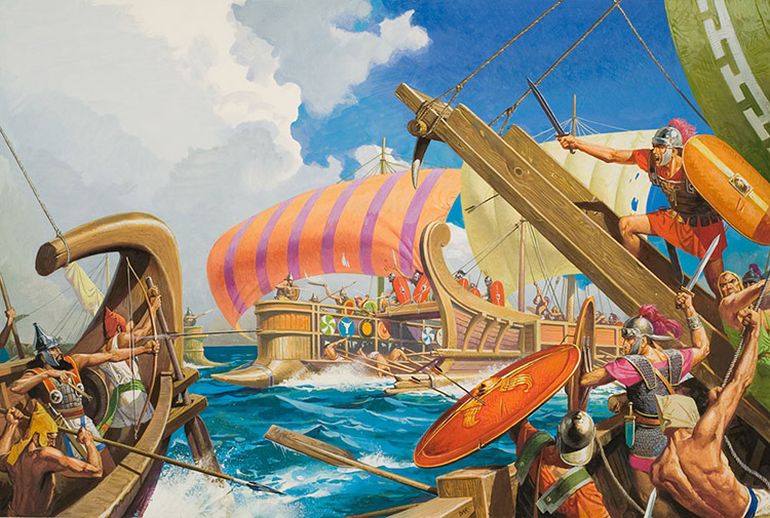
During the timeline of the First Punic War fought between Rome and Carthage (264 – 241 BC), the Carthaginians were known for their prowess in the naval field, partly due to their maritime experience in trading and overseas colonies that stretched beyond centuries. On the other hand, the Romans were considered relative newcomers to the Mediterranean sphere of influence.
In spite of this, it was the sheer ingenuity of the Roman army engineers that brought victory to the Romans in what might have been the largest naval battle in the history of mankind. We are talking about the Battle of Cape Ecnomus (in 256 BC) – which pitted around 350 Carthaginian ships (with more than 150,000 rowers and marines) against 330 Roman vessels (with around 140,000 rowers and soldiers); all the figures being according to the account of Polybius (in World History).
In a bid to nullify the enemy’s numerical advantage, the Roman army devised a mechanism known as corvus (meaning “crow” or “raven” in Latin) or harpago. This was a sort of boarding bridge that could be raised from a 12-ft high sturdy wooden pillar and then rotated in any required direction. The tip of this bridge had a heavy spike (the “corvus” itself) that clung onto the deck of the enemy ship, thus locking the two ships together.
The Roman soldiers crossed across this makeshift bridge and directly boarded the enemy ship. This naval tactic gave the Romans the upper hand since they were known for their expertise in close-quarter combat, as opposed to the Carthaginians who mainly relied on mercenaries. Unfortunately, the Corvus was seemingly abandoned in the post-255 BC era, perhaps because of its destructive effect even on Roman warships.
In any case, this is how 2nd century BC Greek historian, Polybius, described the boarding maneuvers initiated by the corvus –
Once the ravens were fixed in the planks of the enemy’s deck and grappled the ships together, if they were broadside on, they boarded from all directions but if they charged with the prow, they attacked by passing over the gangway of the raven itself two abreast. The leading pair protected the front by holding up their shields, and those who followed secured the two flanks by resting the rims of their shields on the top of the railing.
Greek Fire
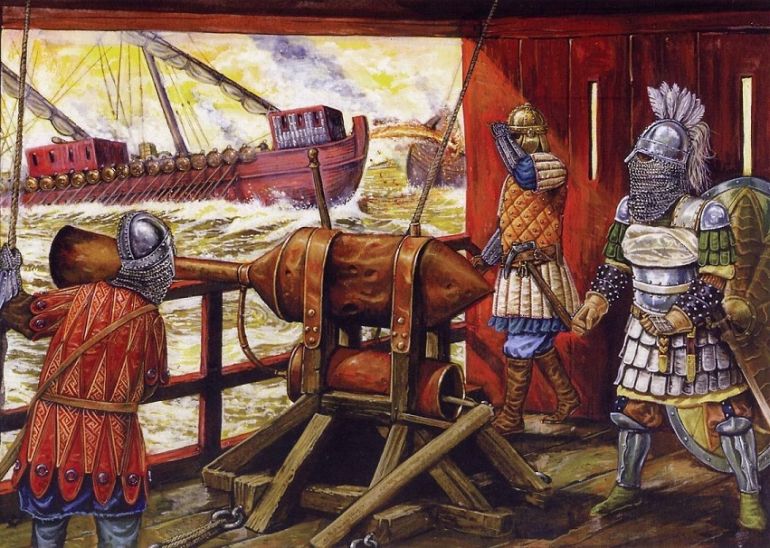
Designed as an incendiary weapon circa the 7th century AD, the Greek Fire is one of the very few contrivances whose gruesome effectiveness was noted by various then-contemporary sources, both Arabs and Greeks. Said to be originally created by a Syrian Engineer named Callinicus (who was a refugee from Maalbek), the technology was sort of a precursor to napalm, and it entailed vicious ‘liquid fire’ that continued to burn even while floating in the water.
In fact, some writers have gone on to explain how the viciously efficient Greek Fire could only be mitigated by extinguishing it with sand, strong vinegar, or old urine. Suffice it to say, the weapon was perfectly tailored to naval warfare; and as such the Eastern Roman Empire (Byzantine Empire) used it in numerous marine-based encounters to secure victories – with notable examples involving the crucial successes achieved against two Arab sieges of Constantinople.
However, the procedures of making and (subsequent) deployment of Greek Fire remained a closely guarded military secret – so much so that the original ingredient has actually been lost over time. Still, researchers speculate that the composition of the substance might have pertained to chemicals like liquid petroleum, naphtha, pitch (obtained from coal tar), sulfur, resin, quicklime, and bitumen – all combined with some kind of a ‘secret’ ingredient.
Highways
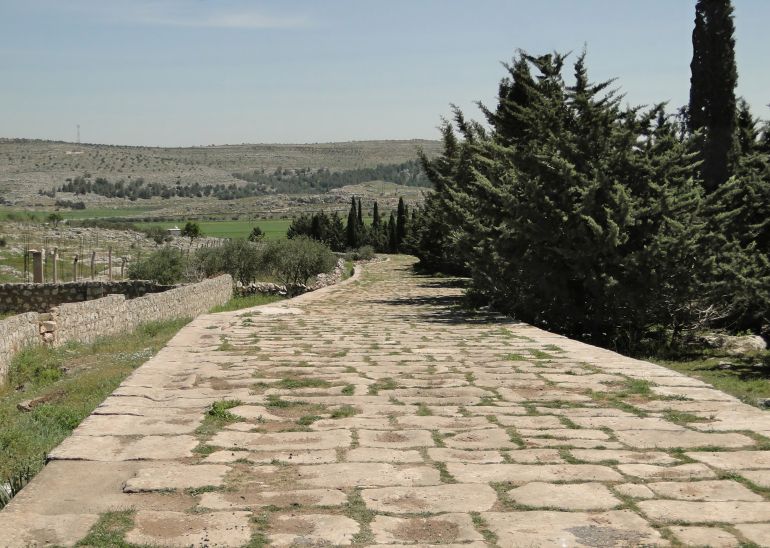
Once again while the construction and development of roads mirrored the historical evolution of urban culture and trade (since the Bronze Age), the ancient Romans took it up a level to complement their juggernaut of a military.
In fact, highways and roads were an intrinsic part of the logistical scope maintained by the Roman Empire at its height, so much so that the massive road networks after the 2nd century AD accounted for a whopping 250,000 miles, of which over 50,000 miles were stone paved. At the peak period of the ancient empire, around 29 great military highways radiated from the capital Rome itself, and these in turn were connected by at least 372 great roads.
Now as for the construction of the roads, building materials that were generally used encompassed a composite of dirt and gravel along with bricks made of either granite or (hardened) volcanic lava. The Roman engineers also gave special attention to the gradient of the roads, with accommodation for curvatures that allowed for efficient water drainage.
In consideration of all these factors, suffice it to say, the Roman network of highways and roads played a major role in the inland carriage of official communications and trade goods. But as with many things ‘Roman’, the infrastructure’s primary purpose was tailored to serve the military, especially in regard to the overland movement of armies.
To that end, highways are estimated to have allowed the Roman legions to travel as fast as 25 miles (or 40 km) per day. And furthermore, intermittently constructed posthouses allowed the armies to maintain communications and share intelligence over relatively long distances.
Onagers
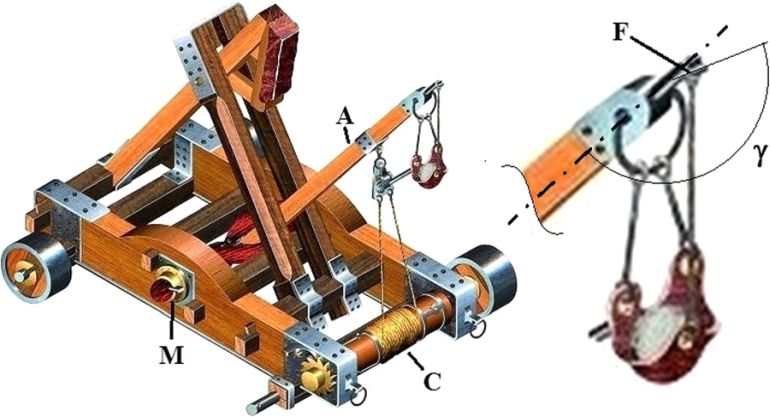
While ballistae were mostly used for afflicting enemy troops with bolts, the Romans also used ‘heavier’ artillery systems that could hurl rocks to take down walls and small fortifications. To that end, the onager (named after the wild ass, because of its ‘kick’) was a type of catapult that used torsional force derived from a twisted rope (or springs) to account for the potential energy needed for a shot. This is how Ammianus Marcellinus, the 4th-century Roman soldier, and historian, described the ancient war machine –
The scorpion, which is nowadays called the wild ass, has the following form. Two posts of oak or holm-oak are hewn out and slightly bent so that they seem to stand forth like humps. These are fastened together like a sawing machine and bored through on both sides with fairly large holes. Between them, through the holes, strong ropes are bound, holding the machine together, so that it may not fly apart.
From the middle of these ropes, a wooden arm rises obliquely, pointed upward like the pole of a chariot, and is twined around with cords in such a way that it can be raised higher or depressed. To the top of this arm, iron hooks are fastened, from which hangs a sling of hemp or iron. In front of the arm is placed a great cushion of hair-cloth stuffed with fine chaff, bound on with strong cords, and placed on a heap of turf or a pile of sun-dried bricks; for a heavy machine of this kind, if placed upon a stone wall, shatters everything beneath it by its violent concussion, rather than by its weight.
Then, when there is a battle, a round stone is placed in the sling and four young men on each side turn back the bar with which the ropes are connected and bend the pole almost flat. Then finally the gunner, standing above, strikes out the pole bolt, which holds the fastenings of the whole work, with a strong hammer, thereupon the pole is set free, and flying forward with a swift stroke, and meeting the soft hair-cloth, hurls the stone, which will crush whatever it hits.
And the machine is called tormentum as all the released tension is caused by twisting (torquetur); and scorpion, because it has an upraised sting; modern times have given it the new name onager, because when wild asses are pursued by hunters, by kicking they hurl back stones to a distance, either crushing the breasts of their pursuers or breaking the bones of their skulls and shattering them.
Interestingly enough, there are also accounts of how the Romans sometimes mixed in combustible substances with the large rocks that were used as projectiles to be hurled toward enemy fortifications. And at times, depending upon wind speeds and the terrain, onagers could even out-range dedicated archers by virtue of their sheer torsional force.
Pilum
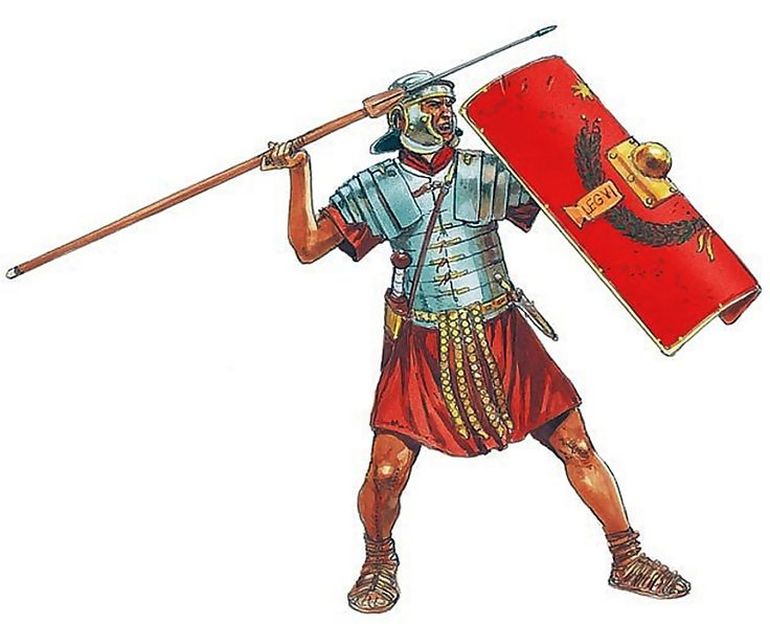
According to Polybius, every Roman soldier carried two types of pila into the battlefield, with one being ‘thick’ and another being ‘thin’. Archaeological evidence (mainly from the site of the Roman siege of Numantia, in Spain) conforms to this assessment.
To that end, both types of the pila were made from around 1.4 m (4.6 ft) long wooden shafts, and these shafts in turn were connected to narrow soft-iron shanks through pyramid-shaped points. However, the ‘thin’ variety differed in the sense that it had its shank socketed, while the ‘thicker’ variety had a flat (and wide) iron piece riveted to a fatter section of the wood.
Anyhow, beyond their shape and thickness, the pilum was engineered as a potent javelin-like throwing weapon that would mostly only favor the Romans. How so? Well, the design in itself was furnished so that it could carry most of the weight behind the aforementioned pyramid point. This endowed the weapon with incredible penetrating power that could go through enemy shields and even injure the opponent shield bearers.
And then came the ingenious part – once the pilum got stuck into the shield, it became very difficult to remove the pointed javelin (mostly due to its varying cross-sectional thickness). This forced the enemy to let go of his shield during the thick of battle. Moreover, the narrow-shanked varieties would twist upon impact, thus making them useless for the enemy – in case they wanted to throw these pila back towards the advancing Roman army.
Plumbata
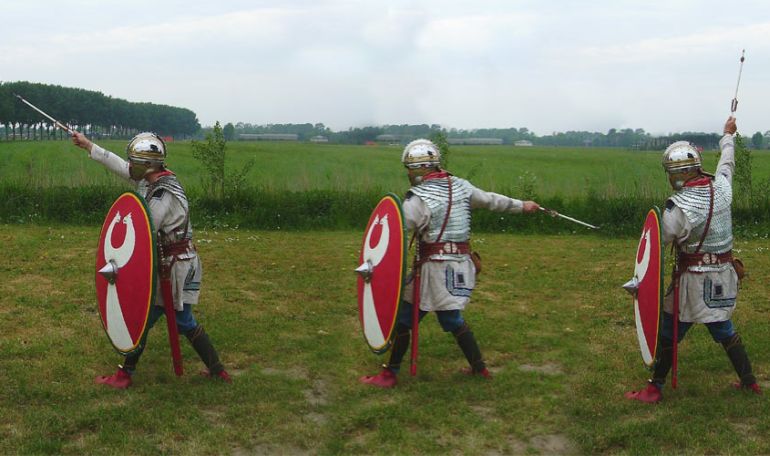
One of the curious and often-overlooked weapons from the late Roman arsenal pertains to the plumbata (also called martiobarbuli). Etymologically relating to plumbum or lead, the weapon was essentially crafted as a throwing dart with lead weights (at the anterior part), while the head part was probably made of iron.
These close sections ultimately gave way to a wooden shaft with fletching. The latter-mentioned modification allowed the ancient Roman soldier to throw the dart (which often went beyond 30 cm in length) in a streamlined manner, either overhand or underhand.
This is how martiobarbuli (roughly translated to “little barbs of Mars”) had been described by Vegetius in his De Re Militari, circa late 4th century AD –
The exercise of the loaded javelins, called martiobarbuli, must not be omitted. We formerly had two legions in lllyricum, consisting of six thousand men each, which from their extraordinary dexterity and skill in the use of these weapons were distinguished by the same appellation.
They supported for a long time the weight of all the wars and distinguished themselves so remarkably that the Emperors Diocletian and Maximian on their accession honored them with the titles of Jovian and Herculean and preferred them before all the other legions.
Every soldier carries five of these javelins in the hollow of his shield. And thus the legionary soldiers seem to supply the place of archers, for they wound both the men and horses of the enemy before they come within reach of the common missile weapons.
An anonymous treatise titled De Rebus Bellicis, also from the late 4th century AD, describes the use of spiked plumbatae (plumbata tribolata); although archaeological evidence has still not been able to confirm its existence. And interestingly enough, martiobarbuli has also been described as a part of the arsenal of the Eastern Roman Empire, with its mention in the Strategicon, written by (late) 6th-century emperor Maurice.
Pontoon Bridge
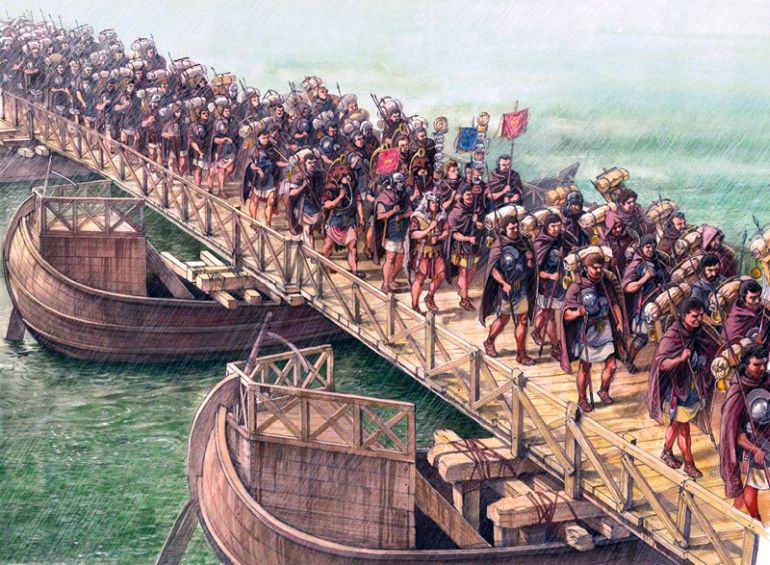
The technology of the pontoon bridge was not at all a Roman invention, with ancient Chinese and Persians making use of the floating mechanism in various military circumstances, like Xerxes’ pontoon bridges being constructed across the Hellespont. However, the Romans did take advantage of its rapid deployment techniques to raid and harass the enemy, thus suggesting tactical scopes rather than strategic ambit.
To that end, the great Julius Caesar was believed to have a penchant for using pontoon bridges to shock and awe his foes. One fascinating example would pertain to the 437 yards (400 m) long floating bridge deployed to cross the Rhine River. This tactical trick caught two Germanic tribes off guard, who were shown the Roman force of arms. Interestingly enough, after demonstrating his superiority in arms, Caesar promptly withdrew from the Rhine territory and dismantled his hastily constructed pontoon bridge.
This is how Gallagher Flinn of How Stuff Works described the Roman version of the pontoon bridge –
Caesar’s Rhine Bridge was clever for a couple of reasons. Building a bridge without diverting a river is notoriously difficult to do, and even more so in a military setting where construction must be guarded at all times, so engineers had to work fast. Rather than driving beams straight into the river, engineers rammed timbers into the bottom of the river at an angle against the current, lending the foundation extra strength.
Protective pilings were also driven upstream to catch or slow down any potentially destructive logs that might float down the river. Finally, the beams were lashed together, and a wooden bridge was built on top of it. In total, the construction took only ten days, used entirely local lumber, and sent a firm message to local tribes about the power of Rome: if Caesar wanted to cross the Rhine, he could do it.
Vegitius also mentioned the use of wood from the light boats that the late Roman army deployed in many river-dominated terrains. According to the ancient writer, these lightweight crafts could be organized and tied together with the aid of planks, nails, and cables, which allowed the hasty construction of a structurally sound floating bridge.
Testudo
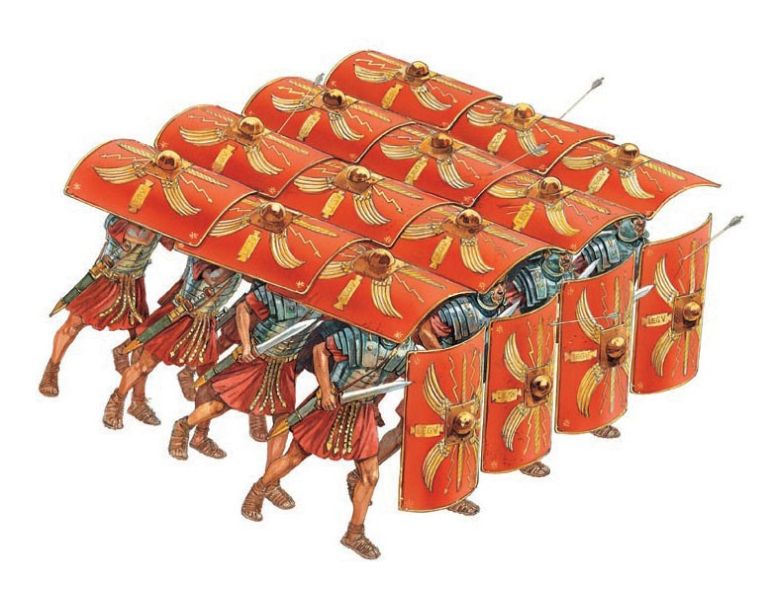
A military formation that was inherently Roman in nature, the famed Testudo (Latin for ‘Tortoise’) was a battlefield tactic that was generally applied by the trained legionaries during siege battles. In its most simplistic scope, the maneuver entailed the positioning and raising of shields that would allow a group of soldiers to form a packed formation covered on all (or most) sides with those shields.
In essence, it was adopted as a purely defensive tactic that allowed the usually infantry-based Roman army to protect themselves against missiles and various projectiles from enemy archers. Suffice it to say, the Testudo formation was not the norm but rather adopted in specific situations to deal with particular threats on the battlefield.
Interestingly enough, according to Livy, in consideration of the sheer discipline and synchronization required to form a Testudo, the formation in itself was actually an evolution of a nifty circus trick. Livy went on to describe how the defensive tactic also allowed the Roman soldiers to push ahead in chaotic siege battles –
A testudo formed in this way was brought up against the lowest part of the wall. When the soldiers who were mounted on it came close up to the wall they were at the same height as the defenders, and when these were driven off, the soldiers of two companies climbed over into the city.
The only difference was that the front rank and the files did not raise their shields above their heads for fear of exposing themselves; they held them in front as in battle. Thus they were not hit by the missiles from the walls, and those which were hurled on the testudo rolled off harmlessly to the ground like a shower of rain from the roof of a house.
And in another interesting note, the 2nd-century Roman statesman and historian (of Greek origin), Cassius Dio, went on to mention how the Testudo was also adopted for protecting pack animals, such as horses or even donkeys. Furthermore, he described, how in contrast to a small group of soldiers, the Testudo was also formed by entire armies in rare scenarios –
This testudo and the way in which it is formed are as follows. The baggage animals, the light-armed troops, and the cavalry are placed in the center of the army. The heavy-armed troops who use the oblong, curved, and cylindrical shields are drawn up around the outside, making a rectangular figure; and, facing outward and holding their arms at the ready, they enclose the rest.
The others, who have flat shields, form a compact body in the center and raise their shields over the heads of all the others so that nothing but shields can be seen in every part of the phalanx alike and all the men by the density of the formation are under shelter from missiles.
Indeed, it is so marvelously strong that men can walk upon it, and whenever they come to a narrow ravine, even horses and vehicles can be driven over it. Such is the plan of this formation, and for this reason, it has received the name testudo, with reference both to its strength and to the excellent shelter it affords.
Featured Image Credit: Warlord Games
And in case we have not attributed or misattributed any image, artwork, or photograph, we apologize in advance. Please let us know via the ‘Contact Us’ link, provided both above the top bar and at the bottom bar of the page.
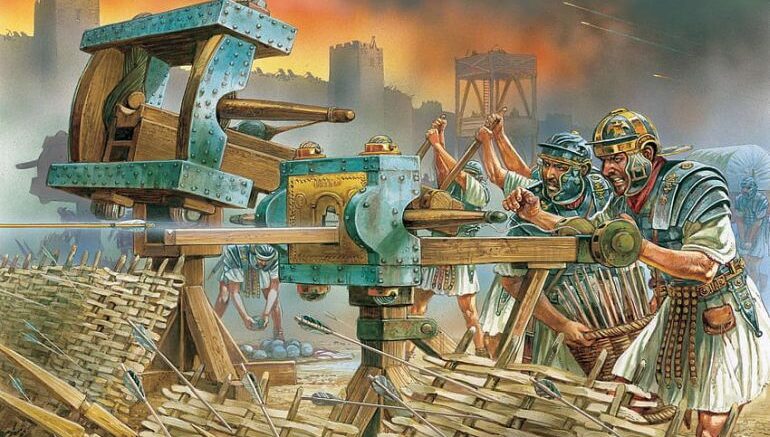
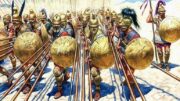


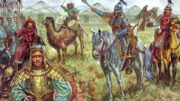
Be the first to comment on "10 Roman Military Innovations You Should Know About"